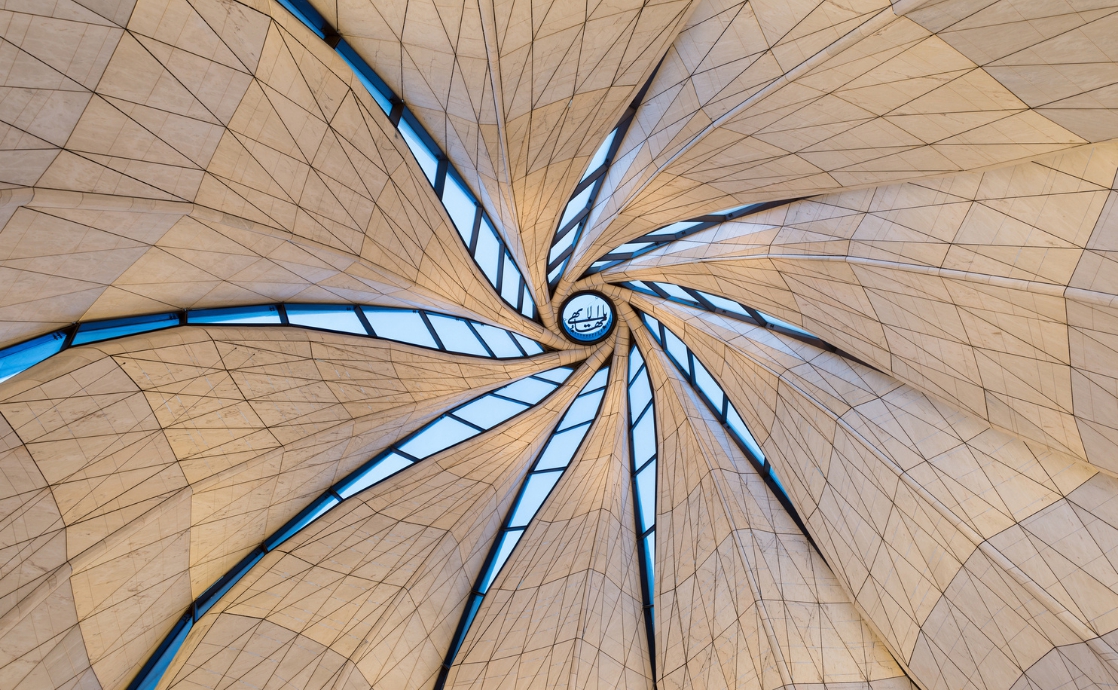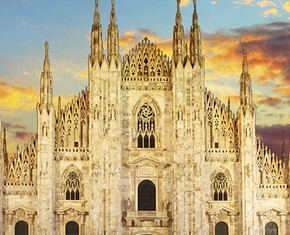The views expressed in our content reflect individual perspectives and do not represent the authoritative views of the Baha'i Faith.
I was recently invited to participate on an interfaith panel where we all responded to this question: What are the truths and misconceptions about your Faith?
Since the Baha’i Faith is a relatively young religion – founded by Baha’u’llah in the middle of the 19th century – not everyone knows a great deal about it, and some people have incorrect information. Here are the misconceptions I addressed:
1. Where Do Baha’is Meet?
People often ask where Baha’is worship, which perhaps indicates an assumption more than a misconception. While it’s true that a Baha’i House of Worship exists on each continent, and several local Houses of Worship are also being built, they’re all meant as places where anyone can come to pray and meditate.
For the most part, though, individual Baha’i communities do not have a Baha’i House of Worship, which are actually more like a gift to the community, not for exclusive use by Baha’is. As Abdu’l-Baha, the son and successor of Baha’u’llah, explained:
The original purpose of temples and houses of worship is simply that of unity — places of meeting where various peoples, different races and souls of every capacity may come together in order that love and agreement should be manifest between them … that all religions, races and sects may come together within its universal shelter.
RELATED: What Happens When You Become a Baha’i?
It’s interesting how much confusion this lack of a fixed building in many Baha’i communities can create for members of other Faiths who feel connected to their places of worship. While Baha’is don’t have traditional churches or mosques, local Baha’i communities may decide to rent or buy a meeting place, usually called a Baha’i Center, depending on the size of the Baha’i community and their circumstances.
The Baha’i House of Worship in North America is in the town where two generations of my family lived before me – Wilmette, Illinois, just outside of Chicago. My family, like many Wilmette residents, witnessed its decades-long construction. Like all Baha’i Houses of Worship, it welcomes everyone, and its nine entrances symbolize the many legitimate paths to the Creator.
2. Is the Baha’i Faith Syncretic?
I sometimes hear, from those without much knowledge of the Baha’i Faith, that it is syncretic. The first time I heard the word syncretic connected with the Baha’i Faith was from a college professor who knew I was Baha’i but wanted to instruct me about this particular weakness he perceived. Syncretic means that a religion contains nothing original, but instead is a collection of teachings culled from other religions in an attempt to fuse them.
More recently I found that the Dalai Lama said something similar – in just two paragraphs of his 10-chapter book, he says he’s “not an advocate of religious syncretism” such as you find in “Bahaism.”
The truth, on the contrary, is that the Baha’i Faith teaches progressive revelation, which means, as Abdu’l-Baha said in a talk he gave in the United States in 1912, that:
… the divine religions of the holy Manifestations of God are in reality one, though in name and nomenclature they differ. Man must be a lover of the light, no matter from what dayspring it may appear. He must be a lover of the rose, no matter in what soil it may be growing. He must be a seeker of the truth, no matter from what source it come.
The Christian Bible clearly displays this concept, as it includes the Old Testament prophets Moses and Abraham, along with the New Testament prophet Jesus Christ, all of whom Baha’is revere and consider divine messengers. The Qur’an puts forth the same idea, because along with Muhammad it includes the Old Testament prophets and also Christ.
This unique conception of religion – which Abdu’l-Baha explained by saying “These holy Manifestations of God are the Educators and Trainers of the world of existence, the Teachers of the world of humanity” – is not an artificial attempt to bring religions together, but instead a completely new way to see all Faiths as one organic whole rather than a collection of competing belief systems. Baha’u’llah’s revelation has been recognized as an independent global Faith in most of the countries of the world.
3. Is the Baha’i Faith a Sect of Islam? No.
Occasionally I’ve heard the uninformed opinion that the Baha’i Faith is a sect of Islam – not true!
Actually, Baha’is have been imprisoned and martyred since their Faith began in Persia, because of the persecution of the powerful Islamic clerics who consider the Baha’i Faith and its progressive principles a threat. If some Islamic countries were confused about how to classify the Baha’i Faith, why have many of them officially recognized it as an independent religion distinct from Islam since early in the 20th century?
Importantly, the Baha’i Faith first emerged in a Muslim culture in what is now Iran, so Islam could be said to be its parent Faith – in the same way that Judaism was the parent Faith of Christianity.
4. Are Baha’is Social Activists?
More than one person has said “Baha’is aren’t involved in social action.” Nothing could be further from the truth.
RELATED: What is the Best Way to Worship? Selfless Service to Humanity
In fact, Baha’u’llah mandated that his followers involve themselves in social action when he said, “Be anxiously concerned with the needs of the age ye live in, and center your deliberations on its exigencies and requirements.”
When Baha’u’llah’s son and successor Abdu’l-Baha visited North America in 1912, he modeled an example of social action when he told Baha’is to racially integrate even in cities which were segregated at that time; and to also apply the Baha’i principle of the equality of the sexes to their lives. Since then, the Baha’i International Community, as a non-governmental organization with a permanent seat at the United Nations, has consultative status with the UN Economic and Social Council. It has an office on the environment involved in sustainable development. Because the Baha’i Faith is based in the grassroots, any social action is the result of consultative decisions made in any given locality and depends on local capacities.
5. Does the Baha’i Faith Focus on the Spiritual and Not the Practical?
“It’s just spiritual, not practical,” was one incorrect comment I’ve heard about the Baha’i Faith – not once, but many times.
Many of the Baha’i writings are mystical and tell us a great deal about spiritual reality – but others lay the foundation for an elegant and very practical democratically-elected global administrative order, designed to gradually unfold and help bring humanity to a permanent world peace. Baha’is have no clergy, and in every location where they reside, Baha’is live according to this administrative order, following the guidance given to them by the Universal House of Justice, the first truly democratic global system of governance. Baha’is believe in the agreement of science and religion; and accept that religion must have practical benefit for humanity – in fact, Abdu’l-Baha said, otherwise it would be preferable to have no religion.
6. Doesn’t the Baha’i Faith Have Some Relationship to Judaism?
When people say that the Baha’i Faith “has something to do with Judaism,” it’s often a result of confusing the word Baha’i with B’nai B’rith, a service organization dedicated to the social and educational betterment of Jews. (B’nai B’rith means “children of the covenant.”)
The implication is that Baha’i is Jewish, which may also be mistakenly inferred by some because the world headquarters of the Baha’i Faith is in Haifa, Israel. Located there long before Israel became a nation, it happened because Baha’u’llah had been exiled to the prison city of Akka in Palestine, then part of the Ottoman Empire, about 85 years before the state of Israel was founded.
Of course, because the Baha’i teachings emphasize the oneness of all religion, Baha’is believe in the Jewish prophets and revere their Faith.
7. Do Baha’is Have Spiritual Leaders?
Being involved in interfaith work, I’m constantly asked “Who’s your local spiritual leader, or priest, or pastor?” The fact is, there isn’t one. Baha’is have no clergy. Instead, the Baha’i Faith operates administratively with a system of local, national and international nine-member governing bodies, all democratically elected without nominations or campaigns. When not convened as a body, each member has no autonomous authority. Rather, Baha’is look to the spiritual teachings of the Bab and Baha’u’llah, as interpreted and elucidated by Abdu’l-Baha, for inspiration and guidance.
8. Cult or Religion?
People often fear and denigrate what they don’t understand, and anyone who says that the Baha’i Faith is a cult definitely does not understand it. Cults have charismatic leaders, and Baha’is have no clergy or leaders at all. Cults separate themselves from society, and Baha’is take part in society. Cults often promote violence, and Baha’is are peaceful, non-violent citizens. Cults separate, and the Baha’i Faith unites.
You may know of some other misconceptions, and I learned on our interfaith panel that they can be a wonderful topic for public discussion. In our group, the discourse enabled all participants to deal upfront with common misconceptions about their religions, and allowed panelists and audience members to be exposed to religions unfamiliar to them. Perhaps you’ll be inspired to organize a similar discussion where you live.
















Comments
Sign in or create an account
Continue with Googleor